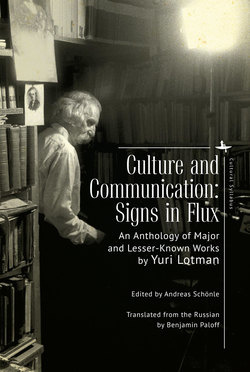Читать книгу Culture and Communication - Yuri Lotman - Страница 10
На сайте Литреса книга снята с продажи.
ОглавлениеTranslator’s Note
BENJAMIN PALOFF
From its inception, the project of offering a representative selection of Yuri Lotman’s work in a new English translation, one that would be both true to the peculiarities of the author’s style and accessible to an audience potentially unfamiliar with it, posed serious challenges that the reader would do well to consider. First among these is Lotman’s often knotty language, which wends between conversational intimacy and dense theoretical jargon. Second is how Lotman quotes liberally (and sometimes inaccurately) from a wide variety of sources, in prose and in verse, in Russian, French, German, and English, from the Middle Ages to the present, each having their own formal and stylistic virtues to which the new readership also deserves access. Finally, there is Lotman’s fondness for wordplay, which ranges from the occasional witticism to a truly generative paronomasia.
We have approached each of these challenges with the intention of replicating for the Anglophone reader the experience of reading Lotman in Russian, within the limits of language and the translator’s own facility with it. Wherever appropriate, proper names appear in their most familiar Anglicized form rather than in scholarly transliteration (for instance, Tolstoy rather than Tolstoi), and we have reined in the occasional superfluous transition that might grate against the economies of English style. While not always precisely replicating that of the Russian original, we have tried to mirror Lotman’s punning to allow the reader access to those instances when one notion grows organically from the expression of another.
Verse, meanwhile, is rendered as verse. This strategy, whereby the reader encounters the lyric poems frequently cited by Lotman in English renderings whose meter and rhyme convey that of the original texts, runs counter to the convention, long current in the field of Slavic studies, of providing literal prose glosses that often seem to go out of their way to deprive the reader of even a glimpse of what makes the poem a poem. The editor and translator have determined that such studied artlessness does a serious injustice, if not to the long-dead poet, who is unlikely to object, then to the reader thus left to take the admiring critic’s word for it. For those who might prefer to read the poems in the original, however, in each instance this is provided after the English translation.
If every translator also edits, retooling the text to serve a new audience in their own language and to their own purposes, then it is equally true that the engaged editor of a translation also translates. That is certainly the case here. Andreas Schönle not only conceptualized the project, selecting its constituent texts and their arrangement, but throughout the process of pulling these texts into English he has been the translator’s close collaborator, interlocutor, and—occasionally, and in the very best spirit—sparring partner. He has rescued the effort from my numerous oversights, misjudgments, and outright errors. The fault for any that remain rests with me alone.
